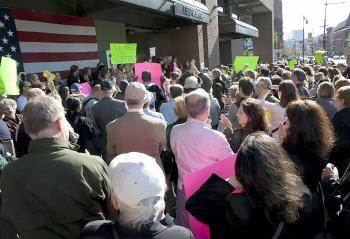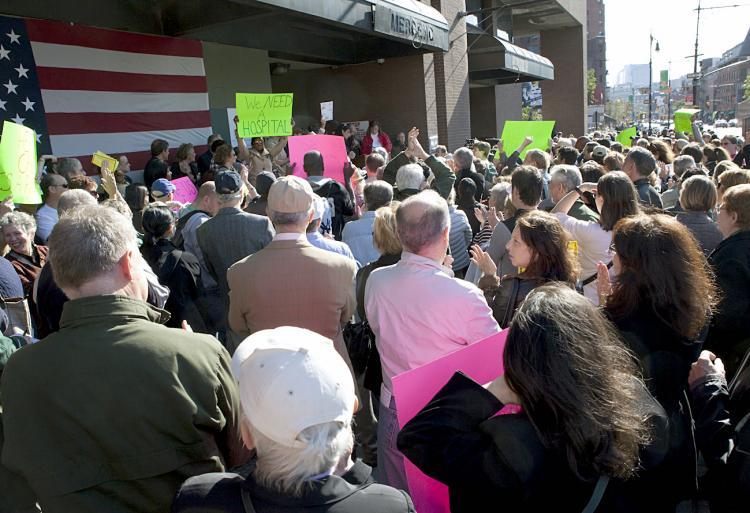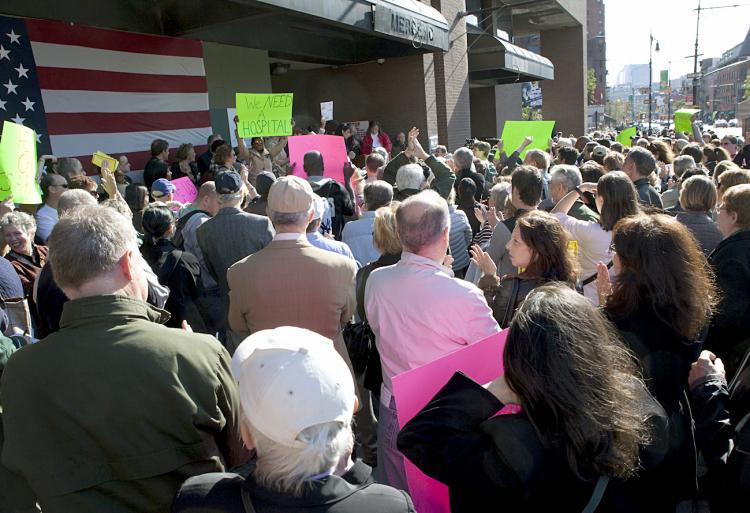NEW YORK—Hundreds of West Village residents filled the sidewalk across from what used to be St. Vincent’s Hospital on Sunday, demanding that public officials lend a hand in acquiring a new hospital. The rally was organized by the Coalition for a New Village Hospital, which has been protesting since St. Vincent’s Hospital closed down on April 30.
Yetta Kurland, a founding member of the coalition and the organizer of the rally, said it was an issue of necessity.
“There are no hospitals on the Lower West Side of Manhattan, and we believe the financial issue is just political will,” she said.
“The money has never been an issue,” Kurland said in reference to the facility’s billion-dollar deficit, further explaining that a large percentage of the debt was transferred to St. Vincent’s through other entities.
“And because St. Vincent’s [is] in the process of bankruptcy, those debts will be discharged, leaving an even better opportunity for a sponsor to come forward and use this hospital, and even acquire this hospital for a reduced price,” she added.
“When we looked at the tax returns for St. Vincent, we found major expenditures—including over $10 million spent on just 10 people’s salaries, millions of dollars spent on consultants, three quarters of a million spent on golf outings. … These are expenses that don’t need to be made. There’s no reason that a hospital run properly would be operating at a loss.”
The city has scheduled an assessment, which is projected to take four to six months to complete, to determine if a hospital is needed at that location.
“There’s already been a needs assessment, called the Berger commission, that determined that it [St. Vincent’s] needed to be in place and services were necessary,” Kurland said. “A quick needs assessment in a matter of three months will never be able to understand the core needs. … Another needs assessment is just wasting time and valuable resources.”
Stephen Berger, chairman of Odyssey Investment Partners, said in 2006 that St. Vincent’s was not needed as a full-scale hospital but should not be closed down. At the time, the facility had a $700 million debt, which Berger recommended to be written off.
David Kaufman, who worked as a doctor at St. Vincent’s before it closed, said it took the coalition 70 days to set up this “100 Days Without a Hospital” rally, so area has now gone without a hospital for a total of 170 days, which has brought overcrowding to nearby hospitals. Kaufman mentioned a patient seen last week who is still waiting to get into an operating room because there just isn’t enough space.
“It took St. Vincent Hospital’s administrators and the Department of Health committee 24 days to shut down our 160-year-old institution, and they shut this legend in a sloppy, shoddy, irresponsible, and probably illegal way,” Kaufman said.
“We will never know how many needless deaths occurred while ambulances were stuck in traffic. We’ll never know how many heart attacks were inadequately treated, how much muscle died, how many strokes were not prevented, and how many brains died [as a result].”
The coalition is urging people to go to the needs assessment steering committee meeting, which is scheduled at Rep. Jerrold Nadler’s office on Oct. 27 at 1:00 p.m.
Yetta Kurland, a founding member of the coalition and the organizer of the rally, said it was an issue of necessity.
“There are no hospitals on the Lower West Side of Manhattan, and we believe the financial issue is just political will,” she said.
“The money has never been an issue,” Kurland said in reference to the facility’s billion-dollar deficit, further explaining that a large percentage of the debt was transferred to St. Vincent’s through other entities.
“And because St. Vincent’s [is] in the process of bankruptcy, those debts will be discharged, leaving an even better opportunity for a sponsor to come forward and use this hospital, and even acquire this hospital for a reduced price,” she added.
“When we looked at the tax returns for St. Vincent, we found major expenditures—including over $10 million spent on just 10 people’s salaries, millions of dollars spent on consultants, three quarters of a million spent on golf outings. … These are expenses that don’t need to be made. There’s no reason that a hospital run properly would be operating at a loss.”
The city has scheduled an assessment, which is projected to take four to six months to complete, to determine if a hospital is needed at that location.
“There’s already been a needs assessment, called the Berger commission, that determined that it [St. Vincent’s] needed to be in place and services were necessary,” Kurland said. “A quick needs assessment in a matter of three months will never be able to understand the core needs. … Another needs assessment is just wasting time and valuable resources.”
Stephen Berger, chairman of Odyssey Investment Partners, said in 2006 that St. Vincent’s was not needed as a full-scale hospital but should not be closed down. At the time, the facility had a $700 million debt, which Berger recommended to be written off.
David Kaufman, who worked as a doctor at St. Vincent’s before it closed, said it took the coalition 70 days to set up this “100 Days Without a Hospital” rally, so area has now gone without a hospital for a total of 170 days, which has brought overcrowding to nearby hospitals. Kaufman mentioned a patient seen last week who is still waiting to get into an operating room because there just isn’t enough space.
“It took St. Vincent Hospital’s administrators and the Department of Health committee 24 days to shut down our 160-year-old institution, and they shut this legend in a sloppy, shoddy, irresponsible, and probably illegal way,” Kaufman said.
“We will never know how many needless deaths occurred while ambulances were stuck in traffic. We’ll never know how many heart attacks were inadequately treated, how much muscle died, how many strokes were not prevented, and how many brains died [as a result].”
The coalition is urging people to go to the needs assessment steering committee meeting, which is scheduled at Rep. Jerrold Nadler’s office on Oct. 27 at 1:00 p.m.







